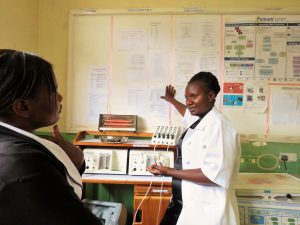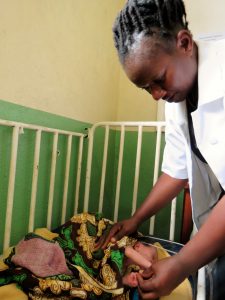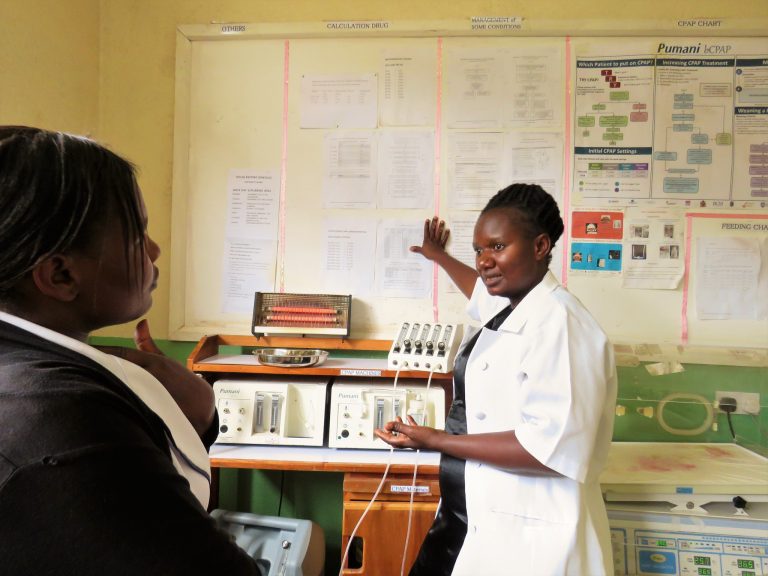“The baby was blue. I watched the midwife deliver the baby and I kept asking myself – why is the whole body out but the head hasn’t been delivered?” The baby was breech and quickly died. “I couldn’t sleep that night because I kept thinking about the situation and wondering what I could have done to help.”
This experience ignited Victoria Lwesha’s passion to become a midwife in order to better help mothers and newborns across Malawi.
Midwifery wasn’t in Victoria’s original plan but helping people was. Born in Karonga district located in Northern Malawi she recalls sitting in secondary school when she heard a loud BANG. As the students raced to the windows they watched as nurses flooded the scene of a traumatic car accident. “When I saw them rushing to help people, it was inspiring to me. So I thought, let me become a nurse.”
Upon completing four years of study at Kamuzu College of Nursing (KCN) Victoria spent one year working as a Nursing Officer at Mulanje Mission Hospital in Southern Malawi before returning for the required one year midwifery training.
“As a midwife you feel satisfied because every time you are supporting a woman and a baby. And every time you are the first person to hear a baby cry. You are the first to receive that baby and hand it to the mother. It is very enriching, very satisfying and it gives you that energy to do more and always do better for the mother and the baby,” exclaimed Victoria.
Despite this fulfillment, Victoria was eager to make a greater contribution which led her to begin teaching at a nearby nursing college before eventually transitioning to the development sector where she hoped to address some of the challenges midwives face in delivering quality care.
“In a country like Malawi, supplies are scarce. To be an effective midwife you need resources, drugs, and support. And if some of the most basic supplies are not available you struggle.” In addition to limited supplies, there are also issues with inadequate infrastructure and human resources. In fact, Malawi has a 70% vacancy rate for midwives partly due to inadequate numbers of trained providers, attrition and more recently the government not employing some of the Midwives graduating from college.
Confronted by a challenging system, Victoria was driven to complete her Master’s in Public Health in order to better understand the intricacies of the Malawian health system. With extensive academic and professional experience Victoria soon worked her way up through several leadership positions at various international NGOs before joining Save the Children International (SCI) in 2012 where she works today as the Senior Technical Advisor for Maternal and Newborn Health (MNH). Now, rather than delivering services directly she provides technical direction on MNH programming within SCI and supporting the Malawi Ministry of Health (MOH) to ensure all programs are of the highest qualities. She also supports in developing guidelines, policies, and strategic documents with MOH and in advocating for increased investment in maternal and newborn health programs.

“I know what midwives go through when they are working. I know the system is challenging and I know what needs to be done” explained Victoria. “Because I have that background understanding, I am better placed to negotiate and to lobby and to advocate on behalf of the midwives who are working at the grass root level. To make sure that the midwife has the supplies, the resources, the standards, the guidelines, and they are ably supported. So while I am not directly delivering babies now, I know that there is someone somewhere delivering babies and is benefiting from the support that I am giving indirectly.”
Victoria’s efforts are making a difference in the support midwives receive through mentorship programs and policy changes like the Every Newborn Action Plan which aims to achieve equitable and high-level coverage of quality essential interventions and commodities for maternal and newborn health.
And while Victoria remains energized by the progress made she knows there is more to be done. “We need to invest in midwives. We still have a shortfall in numbers. We still need to train more midwives, recruit and retain them in the system. And we still need to find funds to increase their pay.”
For International Midwives Day, 5 May, we must raise the voices of champions like Victoria Lwesha who are fighting for the rights of midwives and the invaluable work they deliver every day.

Blog by Alicia Adler, Program Officer, Global Health Corps Fellow of Save the Children International, Malawi Office (This blog is part of our midwifery blog series.)
Do you know a midwife who is working to make a difference for the world’s mothers and babies? Help tell her story! Over the coming weeks leading up to the ICM triennial congress we will collect stories about midwives who are leaders in their field and champions for newborns. Send us a 300-600-word blog that include the midwife’s name, country of work, details about their career and how she or he is making a difference in the world for newborns.
Please send all blog submissions to info@healthynewbornnetwork.org. We will post blogs on HNN and our social media accounts with the hashtag #MidwivesVoices and #ICM2017.
